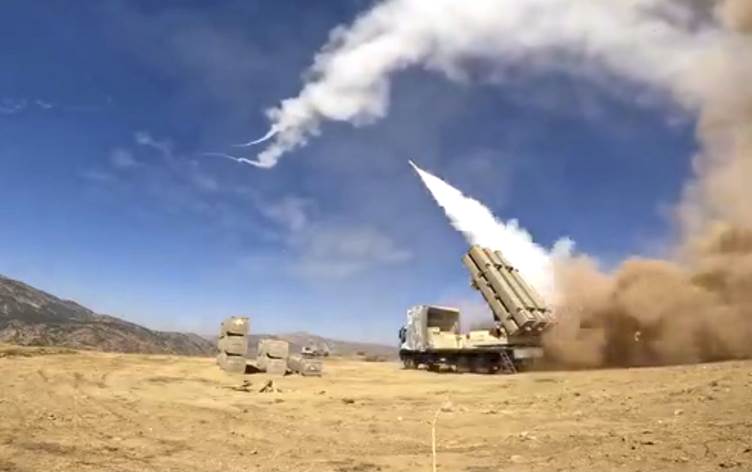
Video grab taken from Fars news agency shows a missile launch from Iran directed towards Sulaimani in the Kurdistan Region. Photo: Fars news agency/AFP
ERBIL, Kurdistan Region - Iran on Monday ruled out an extension of a September deadline previously given to Iraq to disarm Kurdish opposition groups based in the Kurdistan Region and expel them from the border areas.
Tehran has long accused the Kurdistan Regional Government (KRG) of harboring opposition groups it considers “terrorists” and allowing them to use the border areas as a launchpad for attacks against the Islamic republic. Iranian armed forces have carried out many attacks on the alleged positions of these groups, including using both ballistic missiles and drones. In March, Iran and Iraq signed a border protection deal.
Iranian foreign ministry spokesperson Nasser Kanaani on Monday warned that “the deadline for September 19 for the disarmament” of the Kurdish opposition groups and the “evacuation from their military camps will not be extended in any way, and our views have been communicated to the Iraqi side and the officials in the Kurdistan Region.”
“The relationship between Iran and Iraq is entirely friendly and warm,” he said, but lamented that the presence of Kurdish opposition groups in the Kurdistan Region “is a black point on mutual ties.”
Iranian-Kurdish opposition groups based in the Kurdistan Region - namely the Kurdistan Democratic Party of Iran (KDPI), Komala, Free Life Party of Kurdistan (PJAK), and the Kurdistan Freedom Party (PAK) - have been accused of fueling the nationwide protest movement in Iran last September and inciting unrest in the country. The groups, struggling for greater rights for Iran’s marginalized Kurdish population, have fought an on-and-off war with the Islamic Republic.
Kanaani described Tehran-Erbil relations as “constructive” and said that Foreign Minister Hossein Amir-Abdollahian will likely visit the Kurdistan Region during his upcoming visit to Iraq.
In July, Iran threatened to use military action if Baghdad fails to meet the September 19 deadline, with Chief of Staff of Iran’s armed forces Major General Mohammad Bagheri saying that “our operations against these groups will definitely reoccur more severely” if the deadline passes and Baghdad does not meet Tehran’s demands.
Mehr news agency, affiliated with the Islamic Revolutionary Guard Corps (IRGC), citing Iraqi media reports, said that Tehran, Baghdad, and Erbil have agreed to transfer the Kurdish opposition groups to camps in western Iraq along with their families after disarming them.
In March, Iran’s intelligence ministry renewed threats against Baghdad and Erbil and warned that military attacks on the Region will continue unless the border areas are secured and Kurdish opposition groups are disarmed.
In late November, Iran targeted the bases of Kurdish dissident groups in the Kurdistan Region with a barrage of ballistic missiles and suicide drones, prompting the Iraqi government to increase the deployment of troops on its borders with Iran days following the spate of attacks, in an attempt to curb further violations of its sovereignty.
Two months prior, Iran’s IRGC launched around 73 ballistic missiles and dozens of suicide drones towards bases of the opposition parties. At least 16 people were killed and 58 injured in the Iranian bombardment, according to the Kurdish health ministry.
Iran has also accused Kurdish dissident groups of working on behalf of a foreign intelligence agency by smuggling into the country from the Kurdistan Region the parts of three drones that were used to carry out a strike on the Isfahan military facility in late January.
In March last year, Iran attacked Erbil with twelve ballistic missiles, hitting the residence of a well-known Kurdish businessman. The IRGC claimed responsibility for targeting “the strategic center of the Zionist conspiracy and evil by point-to-point missile.” Kurdish authorities vehemently rejected this accusation. A fact-finding committee set up by the Iraqi parliament to investigate the claims found no evidence of espionage activities in the area attacked.
The KRG, which has cordial relations with Tehran, has on several occasions called on neighboring countries and armed Kurdish groups to not use the Region’s land as an arena to settle scores.







Comments
Rudaw moderates all comments submitted on our website. We welcome comments which are relevant to the article and encourage further discussion about the issues that matter to you. We also welcome constructive criticism about Rudaw.
To be approved for publication, however, your comments must meet our community guidelines.
We will not tolerate the following: profanity, threats, personal attacks, vulgarity, abuse (such as sexism, racism, homophobia or xenophobia), or commercial or personal promotion.
Comments that do not meet our guidelines will be rejected. Comments are not edited – they are either approved or rejected.
Post a comment